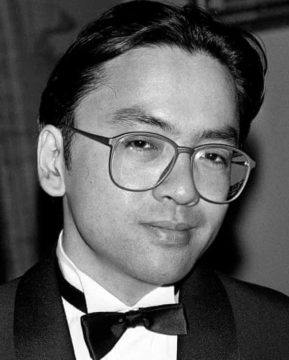Lisa Allardice in The Guardian:
 For the Ishiguro household, 5 October 2017 was a big day. After weeks of discussion, the author’s wife, Lorna, had finally decided to change her hair colour. She was sitting in a Hampstead salon, not far from Golders Green in London, where they have lived for many years, all gowned up, and glanced at her phone. There was a news flash. “I’m sorry, I’m going to have to stop this,” she said to the waiting hairdresser. “My husband has just won the Nobel prize for literature. I might have to help him out.”
For the Ishiguro household, 5 October 2017 was a big day. After weeks of discussion, the author’s wife, Lorna, had finally decided to change her hair colour. She was sitting in a Hampstead salon, not far from Golders Green in London, where they have lived for many years, all gowned up, and glanced at her phone. There was a news flash. “I’m sorry, I’m going to have to stop this,” she said to the waiting hairdresser. “My husband has just won the Nobel prize for literature. I might have to help him out.”
Back home, Kazuo Ishiguro was having a late breakfast when his agent called. “It’s the opposite to the Booker prize, where there’s a longlist and then a shortlist. You hear the rumbling thunder coming towards you, often not striking. With the Nobel it is freak lightning out of the blue – wham!” Within half an hour there was a queue of journalists outside the front door. He called his mother, Shizuko. “I said: ‘I’ve won the Nobel, Shon.’ Oddly, she didn’t seem very surprised,” he recalls. “She said: ‘I thought you’d win it sooner or later.’” She died, aged 92, two years ago. His latest novel Klara and the Sun, in part about maternal devotion and his first since winning the Nobel, is dedicated to her. “My mother had a huge amount to do with my becoming a writer,” he says now.
We are talking on Zoom; he is holed up in the spare bedroom, his daughter Naomi’s undergraduate books on the shelves. His own study is tiny, he says, just big enough for two desks: one for his computer, the other with a writing slope – no one goes in there. Encouragingly, he compares the interview process to interrogation, borrowing from a scene in John le Carré’s Tinker Tailor Soldier Spy that explains how agents are trained to withstand torture by having layers of plausible backstories, “until they are just a shrieking head”. Yet he submits to questioning with good humour; in fact talking for several hours with the exacting thoughtfulness you’d expect from his fiction.
More here.
